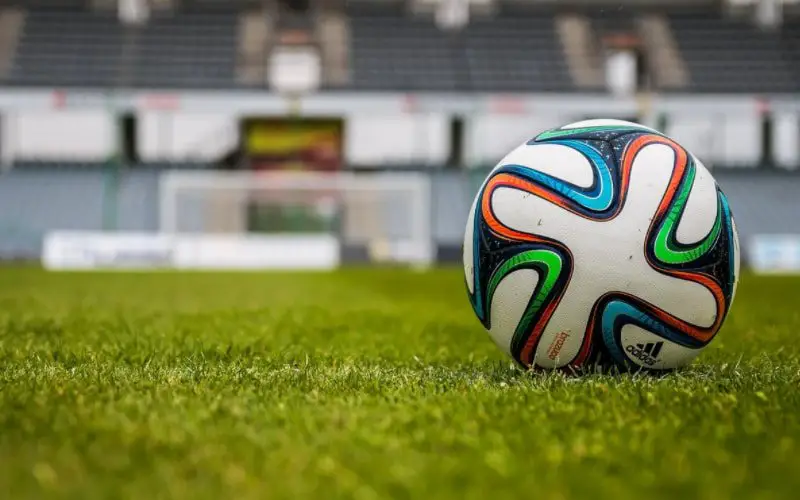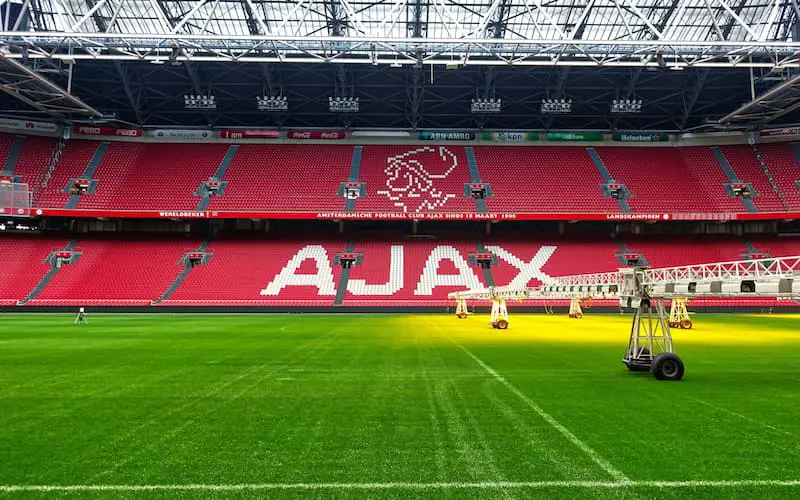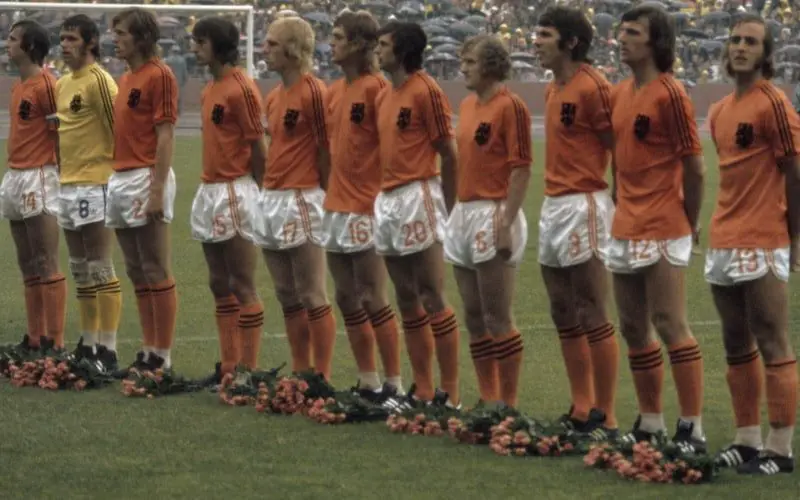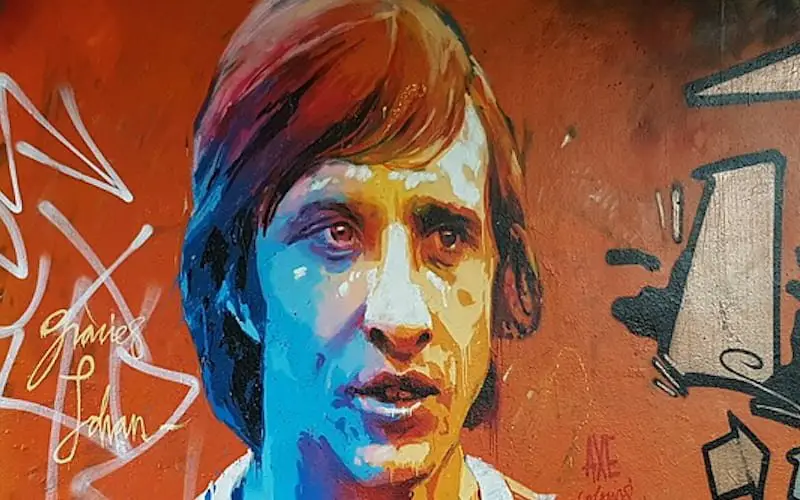

Football is probably one of the most discussed subjects in the Netherlands. I myself am a huge football fan and can go on about it for hours. This isn’t so strange though, as football is by far the most popular sport in the country. The Netherlands is internationally known as a great football country, but why is it they are so good at it?
Football is ingrained in the Dutch culture. 1.193.357 people play football, and there are 2980 clubs. Educating youth players is very important. The facilities are great and there is a lot of competition. The experiences of former football players are used to improve the newer generations.
There are many more factors why the Netherlands has such talented football players. One of the reasons being that the country has a very long and rich history of football. Because of all their experiences in coaching and football they belong to one of the best football countries in the world.
In the Netherlands, football is by far the most popular sport. Not just amongst the players themselves, but also between fans and spectators. For instance, when the Dutch national team is playing, over 17 million coaches can be found in the Netherlands. All of them thinking they can do it better themselves.
Because football is so popular in the country, football clubs can be found in almost any town or city. In total, there are over 2.900 football clubs, 34 of them being professional clubs.
Statistics Dutch football 2018/19:
| Number of members: Boys/men | 1.032.404 |
| Number of members: Girls/women | 160.953 |
| The number of amateur clubs: | 2919 |
| The number of professional clubs: | 34 |
| Number of teams: Boys/men | 55765 |
| Number of teams: Girls/women | 7248 |
Football is a very accessible sport to get into and it is also relatively cheap. Anyone can start playing football, whether you’re small, tall, slim or fat. Football in the Netherlands is for everyone.
Average costs to play football:
| Category | Sports dues | Gear (football shoes) | Gear (kit - clothes) |
| Kids: | €116,- or $136,- | €25,- or $29,- | €35,- or $40,- |
| Juniors: | €141,- or $166,- | €60,- or $70,- | €50,- or $58,- |
| Seniors: | € 189,- or $ 222,- | € 80,- or $ 94,- | € 65,- or $ 76,- |
You can play football in the Netherlands at any preferred level. There are competitions for women, juniors, people with disabilities, seniors, and professionals.
An important reason why the Netherlands is so good at football is because it is part of their culture. Children already start playing football at a very young age. This can be at the local youth football club, but also in the schoolyard with your friends.
Playing football from an early age allows children to develop their ball feel, their technique, and tactical insight. These basics are extremely important for the further development of talent.
Because of how popular football is, and the great number of youth members, the possibility to spot talent in the Netherlands is of course very large. For this reason, the Netherlands invests a lot of money in educating youth players.
This is being done by the professional clubs as the Dutch football association. The Dutch football association makes sure there is enough competition for all of the clubs. Besides that, they also invest large amounts of money in the national youth teams of the Netherlands.
All professional clubs in the Netherlands have their own youth academy. They aim to prepare the youth for the real deal. Many clubs have former football players employed as their youth coaches. They try to transfer their knowledge and experience to the new generation of football players.
Of course, school is also important for these talents. That’s why they often attend special schools, aimed to teach children that are practicing sports on a professional level. At these schools, the sports careers of the students are kept in mind to assure they can spend enough time on sports whilst studying.
Ultimately, the professional clubs hope that a maximum number of talents will transfer to the highest team of the club. During their youth education, there are also those that won’t be selected for the top because of not being good enough. These players, unfortunately, end up at a less prestigious club or will end up in amateur football.
This approach to Dutch youth football makes the Netherlands yield many talents. The talents are professionally guided from a young age and thus prepared for their life as a professional football player.
All this is with the aim to remain one of the best football countries with some of the best footballers in the world. It is important to keep growing in all aspects of the sport, this is why the Netherlands can stay ahead of competition from other countries.
As mentioned before, the Netherlands has a deep history of football, brought to us by some of the best footballers of all time. Think of names like Johan Cruyff, Marco van Basten, Ruud Gullit, and Dennis Bergkamp.
These players have all won a great number of awards and gained a lot of professional experience during their careers.
To make sure all this knowledge and experience doesn’t get lost, many former Dutch football players stay involved in football. For example, some former players stay active as a coach or may take on a similar role at a club or within the Dutch football association.
| Former player | Function |
| Edwin van der Sar | Managing director (Ajax) |
| Marc Overmars | Director of football (Ajax) |
| Frank de Boer | Coach Dutch national team |
| Winston Bogarde | A first-team staff member (Ajax) |
| Boudewijn Zenden | A first-team staff member (PSV) |
By utilizing all this knowledge, the Netherlands ensures that the quality of Dutch football stays at its highest level. This way the Netherlands continues to play at the top of international football.
The highest competition in Dutch football is the Eredivisie. It was founded in 1956, two years after introducing professional football in the Netherlands.
Nowadays, the Eredivisie comprises 18 teams which all compete for the championship. A team can qualify themselves for European football through the Eredivisie. This is how the champions of the Netherlands place themselves directly for the UEFA Champions League. The second-best plays two preliminary rounds of the UEFA Champions League. If they don’t make it through this, they will end up in the UEFA Europa League.
Number three of the Eredivisie can only place themselves for European football through preliminary rounds of the UEFA Europa League.
Numbers 17 and 18 of the Eredivisie will demote directly to a lower division, while number 16 must preserve themselves through play-offs competitions in the Eredivisie.
Participating clubs in the Eredivisie season 2020/21:
| Ajax (34-time national title winner) | FC Groningen |
| PSV (24-time national title winner) | FC Utrecht |
| Feyenoord (15-time national title winner) | FC Twente |
| Sparta Rotterdam (6-time national title winner) | PEC Zwolle |
| Willem II (3-time national title winner) | Vitesse |
| Heracles Almelo (2-time national title winner) | VVV-Venlo |
| AZ (2-time national title winner) | sc Heerenveen |
| ADO Den Haag (2-time national title winner) | RKC Waalwijk |
| FC Emmen | Fortuna Sittard |
The television money is very low in the Netherlands, in contrast to the five best competitions in Europe: England, France, Spain, and France. A total of 100 million euros is available for the Eredivisie. The amount is shared between all clubs based on the end results of the season. Amounts like these are insignificant compared to the sums of money other clubs in a top 5 competition receive. In those circumstances, it can increase to 170 million euros per club.
Because of the relatively low income in the Eredivisie, it is difficult for Dutch clubs to compete with the European top clubs. Therefore, it’s challenging for the Netherlands to attract top players. They often wish for a salary that is just too expensive for Dutch clubs.
This is why the Eredivisie is seen by many football players as a stepping stone to larger competitions. For instance, there are often players who transfer from the Netherlands to clubs like FC Barcelona or Manchester United.
In the Netherlands, people often speak about the traditional top 3. With this, they mean Ajax, PSV, and Feyenoord. In the last forty years, these three clubs largely dominated in Dutch football.
From a European point of view, these clubs did win a lot of prizes, however, we must, unfortunately, go way back in time for this.
Johan Cruyff Arena, home of Ajax Amsterdam:

Ajax:
The most successful and best soccer club in the Netherlands is Ajax, from Amsterdam. This club won the national title an astonishing 34 times. Besides this Ajax also won a couple of European prizes, although these date back quite some time ago.
International achievements:
In the past, a few big names have played football at Ajax. Think of Johan Cruyff, Marco van Basten, Zlatan Ibrahimovic, and Frank Rijkaard.
The stadium of Ajax (Johan Cruijff Arena) is also worldwide known. It was one of the first stadiums in the world capable of opening and closing the roof. This is why other clubs occasionally view the stadium to get inspiration.
PSV:
PSV is a Dutch football club from the city of Eindhoven. It is the club that has won the most national titles after Ajax, this is 24 times. PSV has also booked a few European successes in the past, but we also have to go back in time for those.
International achievements:
Just like Ajax, PSV also housed a few of the best players in the world. For instance, Romario, Ronaldo de Lima, Ruud van Nistelrooy, and Arjen Robben have played for the club.
Feyenoord:
Feyenoord is a football club from Rotterdam. This club is seen as a true folk club. In the last twenty years, Feyenoord has only won the national title once, bringing the total of the club to 15 times. Feyenoord won a few big prizes in the past.
International achievements:
In the past Feyenoord has contracted some of the Netherlands’ best football players such as Giovanni van Bronckhorst, Johan Cruyff, Ruud Gullit, Coen Moulijn and Willem van Hanegem.
Dutch football is internationally known for its “total football”. For many a well-known football term, but what exactly does it mean?
“Total football” became known publicly in the early ‘70s. Ajax and the Dutch national team were one of the first to adapt this play style.

The “total football” got worldwide attention during the World Championship of 1974. Led by their captain Johan Cruyff, the Dutch national team played what seemed like a new style of football for many people.
Previously football was played fairly “static”, with only a few position changes, and a lot of long balls being played, but now a completely new style of playing football was applied. Continuous players were taking each other’s positions and defenders moving forward along with the rest. For instance, this made it possible for Johan Cruyff to play as a defender whilst another defensive player appeared in an attacking position.
Because of this way of playing, the formation of the team always stayed the same, but there were now many more possibilities to set up an attack. This new way of playing football made it very difficult for the opponent to defend.
It resulted in the Dutch national team reaching the World Championship finals. Unfortunately, the team lost to West Germany with 1 - 2.
From that moment on, many clubs and teams got inspired by the “total football” that the Netherlands had shown during the World Championship. One of the most well-known examples of teams adapting this playstyle is the FC Barcelona team led by coach Johan Cruyff in the early ‘90s.
The FC Barcelona team played fantastic football led by the “total football” inspired Johan Cruyff. The entire football world enjoyed the football that he and this team displayed. For the club, this resulted in winning the national title 4 times, as well as the Europe Cup I once.
Today’s modern football is always still inspired by the “total football” of Johan Cruyff and the Dutch national team of 1974. Coaches like Jürgen Klopp, Pep Guardiola, and Frank Rijkaard all mentioned “total football” to be their source of inspiration for their own play style.
Video explaining total football:
The Dutch national team is worldwide known thanks to the magnificent “total football” from the earlier days. Some of the world’s best football players played for the Netherlands, think of names like Johan Cruyff, Ruud Gullit, Ronald Koeman, Arjen Robben, and Robin van Persie.
Even though all these renowned players have played for the Netherlands, it resulted in a relatively low amount of prizes. In all of its history, the Netherlands only won a single European Championship.
The Netherlands did however reach the finals of the World Championship twice. This happened during the World Championship of 1974 in West Germany and during the World Championship of 2014 in South-Africa.
The greatest success in Dutch football history is winning the European Championship of 1988 in Germany. This happened while being led by one of the best coaches ever, Rinus Michels. The Dutch selection consisted of some world-class players like Ronald Koeman, Ruud Gullit, and Marco van Basten.
Road to final Dutch national team 1988:
| Group stages | Home | Away | Result |
| June 12th 1988 | The Netherlands | Soviet Union | 0-1 |
| June 15th 1988 | England | The Netherlands | 0-3 |
| June 18th 1988 | Ireland | The Netherlands | 0-1 |
| Semifinals | |||
| June 21st 1988 | West Germany | The Netherlands | 1-2 |
| Final | |||
| June 25th 1988 | The Netherlands | Soviet Union | 2-0 |
The Dutch national team managed to win this European Championship final thanks to the world-famous goal made by Marco van Basten. Van Basten also completed the European Championship as having scored the most goals in the tournament with five goals. The Dutch defender Frank Rijkaard was announced best player of the tournament.
The famous goal scored by Marco van Basten:
On June 26th, 1988 the Dutch national team arrived in the Netherlands. The honoring of the team became the largest national celebration since the liberation of the Netherlands on May 5th, 1945.
The Netherlands celebrating winning the World Championship 1988:
The Netherlands is known abroad as an authentic football country. There are of course different reasons for this. One of these is that the Netherlands has harvested some of the world’s best football players of all time.
Below I will showcase a few of these world top players with a short description of their careers.
Johan Cruyff:
Clubs:
Ajax, FC Barcelona, Los Angeles Aztecs, Washington Diplomats, Levante, Feyenoord.
Description:
Johan Cruyff is by far the best football player that the Netherlands has ever produced. Some even say that he is the best football player of all time. Cruyff is partly responsible for the “total football” philosophy. With this, he conquered the hearts of many football fans in 1974.
During his career, he played for clubs like Ajax, FC Barcelona, and Feyenoord. After his playing career, Johan Cruyff had a successful career as a coach. For instance, with his club FC Barcelona he won prizes such as the Europa Cup I, Europacup II, and 4 times the national title.
The vision of Cruyff on football has meant a lot to Dutch football. Training youth players was one of the most important parts of his football philosophy, which is still being applied at his former club Ajax.
Marco van Basten:
Clubs:
Ajax, AC Milan.
Description:
Marco van Basten is one of the best Dutch attackers ever. During his career, he only played for two clubs: Ajax and AC Milan. The biggest prize that Marco van Basten won during his career was probably the European Championship in 1988. The goal that he scored during the finals of this tournament is still seen as one of the most magnificent goals of all time.
Besides winning the European Championship in 1988, he also won the Europa Cup I twice and the Europacup I once. Unfortunately, Marco van Basten was injured badly and had to quit playing football at the early age of 31.
After his football career Marco van Basten became trainer of Ajax and the Dutch national team.
Ruud Gullit:
Clubs:
Feyenoord, PSV, AC Milan, Sampdoria, Chelsea
Description:
Ruud Gullit is probably the best-known midfielder that the Netherlands ever produced. Ruud Gullit also got international recognition for his qualities. He won the prize for “world football player of the year” twice. Gullit was also the coach of Chelsea, LA Galaxy, and Feyenoord. Nowadays he is working as an analyst for Dutch and British television.
Of course, these are not all of the well-known players from the Netherlands. Below, you will find a list with a number of other big names from Dutch football history.
Some of the best Dutch football players ever:
Many of these former football players have stayed involved with Dutch football after their football careers. Through this, they have contributed tremendously to the development of modern Dutch football.
Besides well-known football players, the Netherlands is also home to some of the best coaches. These coaches, together with former football players, have had a great impact on the development of Dutch football. This makes them partly responsible for the success of the Netherlands in football.

Below you can find a list containing the most successful Dutch coaches ever. All these coaches have meant a lot for Dutch football, each in their own way.
Rinus Michels:
Together with Johan Cruyff, Rinus Michels is probably one of the most important people of Dutch football history. Many people only know him as a coach, but he has also had a successful career as a football player.
From 1945 until 1958 Rinus Michels was an attacker of Ajax. For this club, he managed to score a total of 122 goals in 264 matches. With Ajax Rinus Michels won the national championship twice. He also played five games for the Dutch national team. Unfortunately, he had to put an end to his career in 1958 due to hernia complaints.
Rinus Michels managed to achieve his greatest successes as a coach. In the early ‘70s, Michels was one of the founders of "total football". He applied this playstyle during the ‘70s with Ajax and later in 1974 with the Dutch national team.
Rinus Michels has achieved his greatest successes during his career as a coach with Ajax, FC Barcelona, and of course the Dutch national team. In addition, he was also a coach of Bayer Leverkusen, Los Angeles Aztecs, and 1. FC Köln.
Rinus Michels can call himself one of the most influential people of modern football since the introduction of “total football”.
Biggest achievements as a coach:
Johan Cruyff:
Johan Cruyff is naturally well known as one of the best football players of all time. After his career as a player, he also proved to be an excellent coach. “Total football” all started with Cruyff. With this, he conquered the hearts of many football fans all across the globe in 1974.
He loved playing this type of football and continued to do so by the time he became a coach. He started his career as a coach with Ajax. With this club, he won the Europacup II in 1986/87. In 1988 Johan Cruyff waved goodbye to his club and left for his great love of Spain; FC Barcelona.
It was at this time at FC Barcelona that Johan Cruyff played using his beloved “total football”. This eventually got him and his team to play spectacular football and win many prizes. This way of playing football went down in history as one of the best-played football of all time.
After his career as a coach, Johan Cruyff stayed closely involved with Dutch football. After all, he is the founder of the football philosophy adapted by his all-time favorite club, Ajax.
Biggest achievements as a coach:
Louis van Gaal:
Just like Rinus Michels and Johan Cruyff, Louis van Gaal owned a career as a football player before he became a coach. However, his football career was way less successful than his later career as a coach.
As a football player, Louis van Gaal played for Antwerp FC, Telstar, Sparta Rotterdam, and AZ. In total, he played over 300 matches and managed to score 34 goals. In 1987 Louis van Gaal ended his career as a football player and immediately started working as a coach.
Of all Dutch coaches, Louis van Gaal most likely has trained the biggest clubs in the world. In the ‘90s Van Gaal booked enormous successes with Ajax. With players like Patrick Kluivert, Frank de Boer, Marc Overmars, and Clarence Seedorf Van Gaal won great European prizes.
In the late ‘90s, Louis van Gaal left for FC Barcelona. With this club, he won the UEFA Super Cup and became the National Champion of Spain.
Later Louis Van Gaal became coach of clubs like Bayern München, AZ, and Manchester United. In 2014 he managed to take 3rd place with the Dutch national team at the World Championship 2014 in Brazil.
Biggest achievements as a coach:
Aside from all the coaches mentioned above, the Netherlands is home to a few other great coaches. Think of names like Ronald Koeman, Guus Hiddink, Frank Rijkaard, and Dick Advocaat.
Learn more about sports in the Netherlands!
Read one of our following blogs if you are interested in Dutch sports.
- Is The Netherlands Good At Field Hockey? We Find Out
- What Is The Best Soccer Club In The Netherlands
- What Is The Most Popular Sport In The Netherlands
- 30 Facts About Sports In The Netherlands (Find Out Now)
With this article, I hope to have answered your question about why the Netherlands is so good at football. As you were able to see, many coaches and former football players have had an important influence on today’s Dutch football. It is partly thanks to these people that football has naturally become embedded in the Dutch culture and that the Netherlands will always remain a football country.